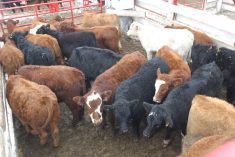MORRIS, Man. — Cam Bartel hopes AgriStability and other safety net programs can be fixed.
Then he would feel OK about getting back into farming.
“We have had to exit hog production,” said Bartel, who shut his hog feeder barn a few years ago.
“AgriStability used to work when we had profitable margins, (but) after subsequent years of negative margins and changes to the programming, it became ineffective.”
Bartel was one of the disappointed and discouraged farmers who appeared before the Manitoba Agriculture Business Risk Management Task Force during province-wide consultations in July.
Read Also

Critical growing season is ahead for soybeans
What the weather turns out to be in the United States is going to have a significant impact on Canadian producers’ prices
He lives in the southern Red River Valley and noted the problems with AgriStability during multi-year income slumps, but his concerns were echoed across the province.
The day before in Beausejour, a couple of farmers said today’s programs fail to sufficiently protect net income to keep farms sound during bad times.
“Guaranteed income is what we need to move forward,” said one.
Task force chair Bill Uruski said in an interview after the final meeting wrapped up that the failure of the present safety net system to protect net income has been a consistent theme through the consultations.
AgriStability’s problems have created more than disgruntlement, he said. Revisions that slashed coverage levels have “diluted (it) to the point that many farmers are, in fact, leaving them.”
The task force’s objective is to find ways to adjust the risk management safety net to deal with the likelihood of more severe and prolonged crop and livestock production problems as climate change makes weather events more volatile and extreme.
Frieda Krpan, chair of the Manitoba Agricultural Services Corp. and a St. Laurent farmer, said this concern is not limited to Manitoba, but the province is taking the lead because of recent events such as massive flooding.
“The other provinces are looking at what we are doing,” Krpan said at the Beausejour meeting.
“They are all affected.”
While unhappiness with AgriStability was near-universal, so too was satisfaction with the overall functioning of crop insurance.
Farmers at the Morris and Beaus-ejour meetings said crop insurance seems to work well, and task force members said most farmers seemed happy with the present system, with “tweaking” being the main concern.
The task force, which must present its final report before the end of the year, will now talk with experts in various fields and collect more written submissions.
Krpan said the government has promised to act on the task force’s conclusions.
“None of us would have agreed to be part of this task force to create a report that sits on the shelf and collects dust,” said Krpan.
“I will hold (agriculture minister Ron Kostyshyn’s) feet to the fire, and the premier’s.”
Uruski said a dominant issue in Manitoba is water management from floods and droughts, both of which can have devastating multi-year impacts.
However, weather seems to be getting more volatile, and the government needs to find “ways that farmers can mitigate the damage of extreme weather conditions over the longer term.”


















